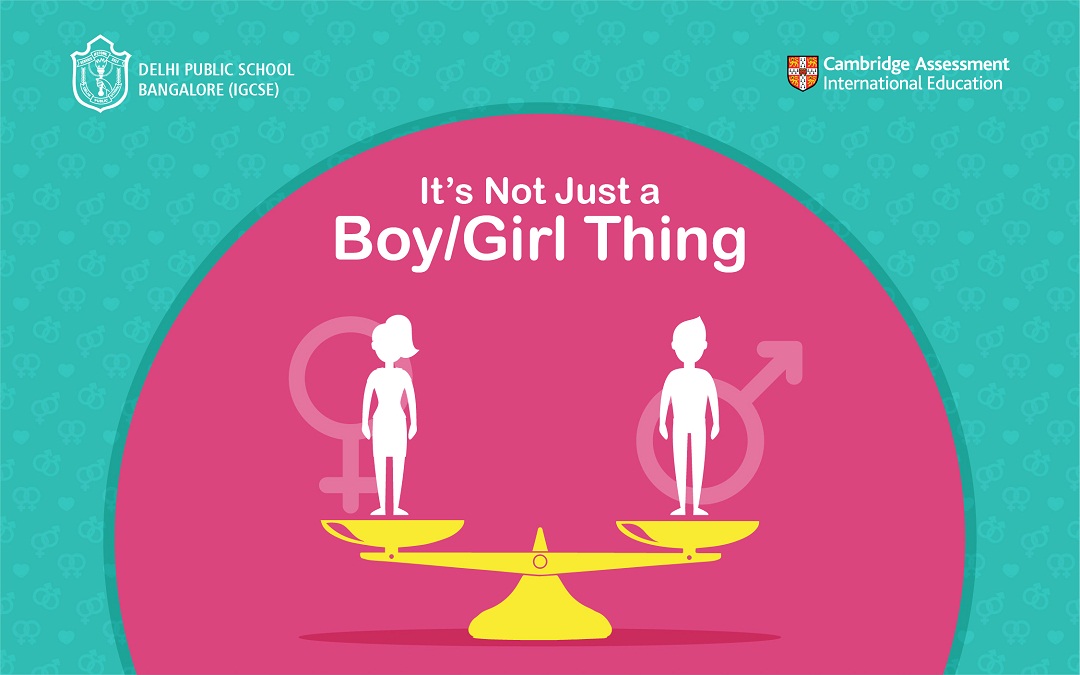
Teaching Your Child Gender Sensitivity
What’s the difference between boys and girls? Ask a group of children this question and you’ll get a wide variety of answers. Children are well aware of the differences between the genders and, intentionally or not, this affects the way they interact with each other. If you’ve ever heard your child say, “Boys are stupid” or “He throws like a girl,” you’ll know that they’ve already formed certain ideas about the opposite gender. And these thoughts don’t exist in a vacuum; they are shaped by societal messaging and can lead to hurtful speech and behaviour. This is why it’s important that we teach our children about gender sensitivity right from a young age.
First, what is gender sensitivity?
Simply put, gender sensitivity is behaviour that avoids discrimination by understanding and accepting the multiple differences between men and women. It is a way of thinking that fosters respect and compassion for others — regardless of these differences. Gender sensitisation among children teaches them to rely less on subconscious assumptions and generalisations and more on individual personality traits. And like most lessons, gender sensitivity starts at home. There are some simple things that any parent can do to instil this conscientiousness, and here are just a few:
Be a role model.
Children tend to mirror the attitudes and actions of their parents, so the easiest first step is to lead by example. Something as simple as taking turns with your partner to do different chores can break the stereotype that certain activities are for a particular gender. In addition, taking time to understand the impact of your words is equally important. What kind of message do you imply when you say “boys will be boys”? How will that affect your child in the long run? By being conscious of your own language, you’re indirectly teaching your child to avoid generalisation and to think about others before acting.
Keep communication lines open.
Children ask a lot of questions. A large step towards gender sensitivity is answering these without hesitation — including the ones that we’d rather avoid. Anger, laughter and avoidance make kids associate these topics with shame, so ignore your first instinct; be open and honest. Keep the conversation straightforward and use simple, age-appropriate language. With just a quick conversation, you can teach both boys and girls to be more understanding of others’ interests, and guide them to think before making hurtful comments based on preconceptions.
Let them do what they enjoy.
When it comes to hobbies and extracurriculars, we may be tempted to push our children in a certain direction. Instead, let them explore the things that interest them and expose them to role models of both genders within these fields. Your son’s interest in dance may be fleeting, or it may be something he becomes truly passionate about in the long run. Either way, your encouragement will teach him not to be ashamed of his interests. The same holds true with toys. A doll and an action figure are, in essence, the same toy with the same functions. They both serve to enrich the imagination, no matter who is playing with them. Encouraging your child to play and enjoy themselves, whether it’s with a football or a kitchen set, simply allows them to push the boundaries of their imagination.
Allow them to express themselves.
How many times have we heard the phrase, “Boys don’t cry” or “It’s not ladylike to shout”? At some point we seem to have assigned ‘appropriate’ emotions to different genders. For this reason, it is important to keep children from internalizing their negative emotions. Teach your child to talk through what they’re feeling and encourage them to come to you with their problems. Something as simple as providing a sincere, listening ear can teach them not to bottle up their feelings. Working with your child to help them express their emotions in a healthy manner can help them feel more secure in their identity and, in turn, help them empathise with their peers.
Read the literature.
When you’re looking to broach topics such as sexuality and gender with your children, you may find yourself at a loss. Whether you feel you don’t know enough to give them the best understanding of the topic or you just don’t know where to start, the key is to stay informed. Websites such as Young Women’s Health and its counterpart, Young Men’s Health, can answer your questions in a clear and straightforward manner. TARSHI Publications also has books — for both adults and children — that cover these topics in a clinical manner. TARSHI’s ‘Yellow Book’ is especially helpful for parents as it is filled with tips, tools and advice on starting a conversation with a young audience. Even a simple Google search will yield blogs and testimonials from other parents that will help you inculcate gender sensitivity in your child.
Every parent wants their child to grow into a compassionate adult. The first step in that direction is teaching them gender sensitivity. By creating an environment of respect and understanding, your child will learn that the differences between themselves and their peers will only enrich their friendships. Discouraging gender-based stereotyping creates new parameters for your child to excel, without being held back by expectations. This lack of expectation will also extend to their peers as they start to see achievements and failures on an individual level, rather than an indication of the group. And, ultimately, you will foster open-mindedness and empathy in your child’s day to day life.
